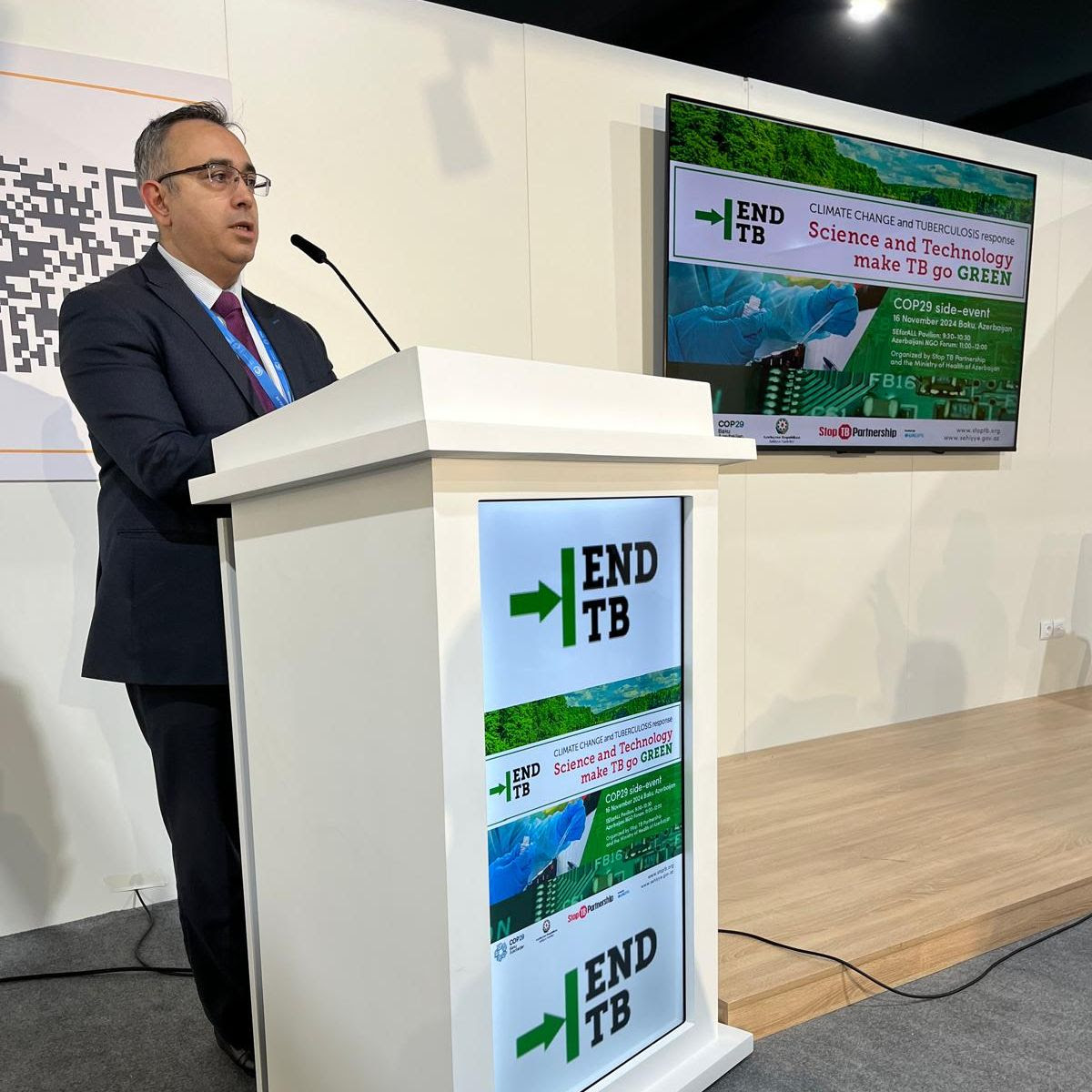NEWS ALERT - 18 November 2024 l Baku, Azerbaijan
Azerbaijan’s Ministry of Health and Stop TB Partnership with the support of Azerbaijani NGO Forum and “Sağlamlığa xidmət” public UNION organized the event‘Climate Change and Tuberculosis Response – Science and Technology Make TB Go Green’ on 16 November 2024 at the 29th session of the Conference of the Parties to the United Nations Framework Convention on Climate Change (UNFCCC), or COP29.
As the world grapples with the accelerating impacts of climate change, this event highlighted a pressing health crisis that continues to intensify: the tuberculosis (TB) pandemic. The event showcased innovative low-emission solutions to build climate-resilient health systems and revolutionize TB response through groundbreaking scientific and technological advances.
As climate change reshapes ecosystems and human environments, the spread of infectious diseases, including TB, will likely be exacerbated. TB, already the world’s leading infectious disease killer—affecting over 10 million people and claiming over 1.2 million lives each year—is expected to rise further due to climate-related disruptions.
Shifts in temperature, humidity, and precipitation, coupled with food insecurity and mass migration, intensify vulnerabilities to TB, particularly in regions where undernutrition and displacement prevail.
“This year’s COP29 conference is a pivotal moment to raise awareness, align global efforts, and drive investment towards innovative, climate-resilient health solutions that address TB at its core. Ending TB must become a global priority—as it is a priority for Azerbaijan—particularly as we face the challenges brought about by climate change," emphasized Dr. Nadir Zeynalov, Deputy Minister of Health of Azerbaijan.
The symposium featured real-world examples of how new TB tools that are downsized and digitally enabled are leveraging cutting-edge technology to become more climate-resilient and environmentally sustainable. Key innovations featured at the event as examples included:
MolBio’s decentralized deployment of rapid molecular testing platform, powered by batteries and solar energy reduces the carbon footprint associated with patient travel and facility-based care, strengthening access even in climate-stressed regions.
FujiFilm’s portable diagnostic tools, like the low energy-consuming ultraportable X-rays, allowing communities to access diagnostics without traveling to centralized facilities.
Qure.ai’s AI-powered solutions leverage AI and deep learning technology to rapidly analyze chest X-ray images to detect TB and triage for confirmatory lab testing, enabling faster and decentralized diagnosis and treatment.
These innovations modernize TB screening and diagnosis and contribute to the broader agenda of reducing greenhouse gas emissions from healthcare systems—an imperative step towards aligning health responses with global climate goals. 
A major outcome of the event highlighted the urgent need for increased investment in TB response to meet global targets and scale up climate-friendly new tools.
We now have exciting new tools for TB screening and testing which not only have the potential to move the world faster towards ending TB but they are also climate-friendly and climate resilient. Additional funding is urgently required to scale up these tools, said Dr Suvanand Sahu, Deputy Executive Director of the Stop TB Partnership.
The political declarations from recent UN High-Level Meetings on TB called for an annual funding of USD 22 billion by 2027, alongside an additional USD 5 billion per year for research and innovation.
However, a substantial financial gap remains. The Stop TB Partnership collaborates closely with governments, civil society, and global organizations to turn the commitments into tangible action aiming to make strides toward ending TB by 2030.


